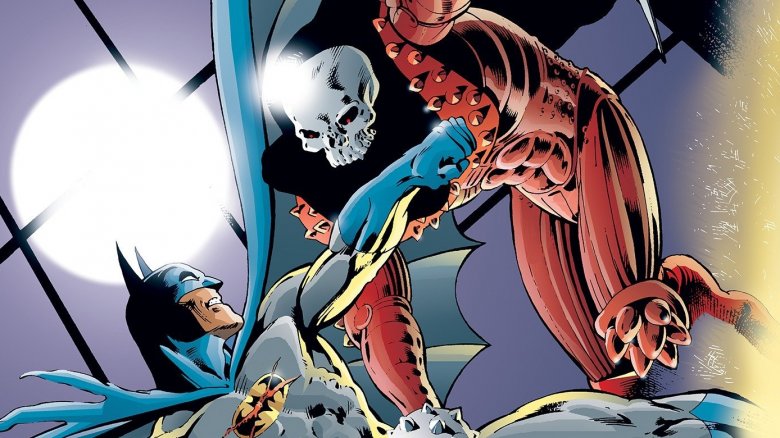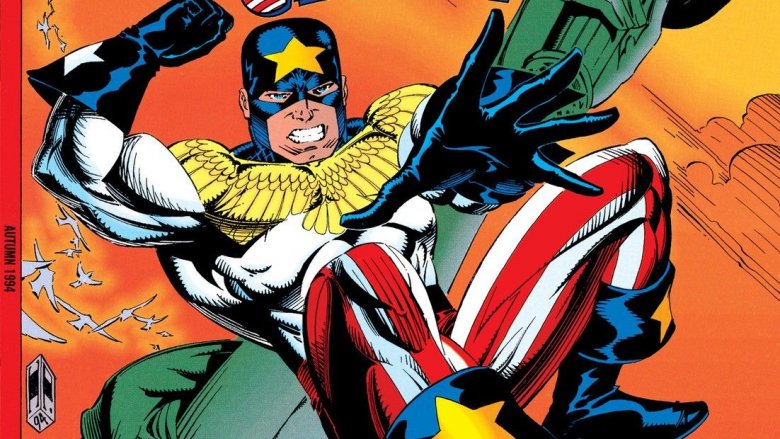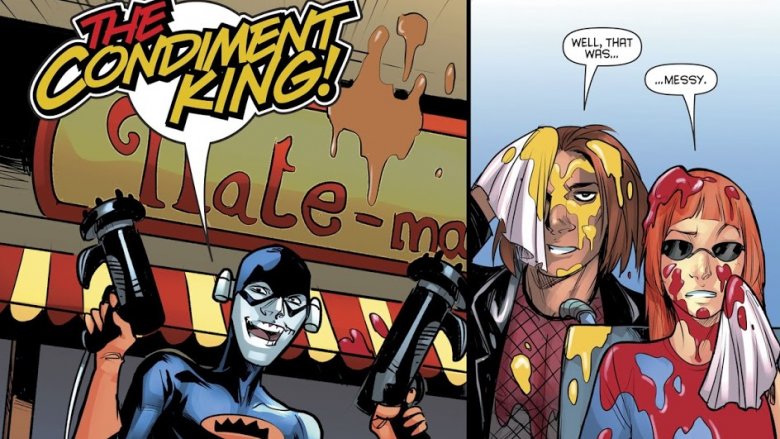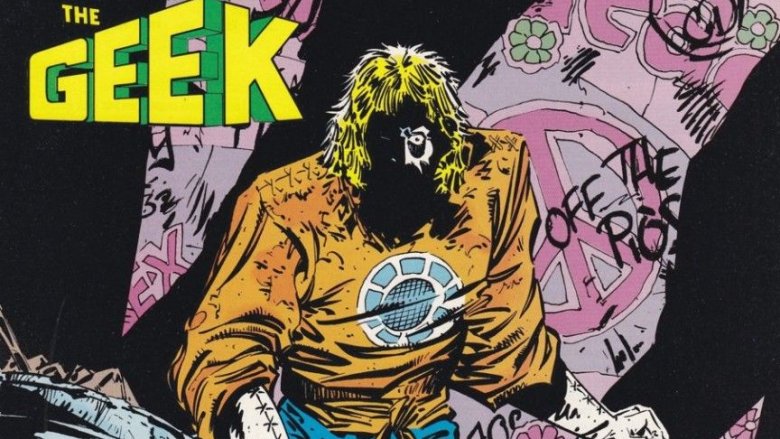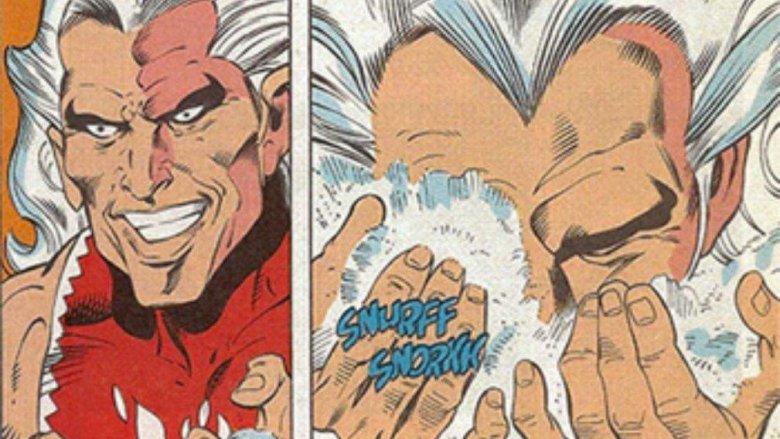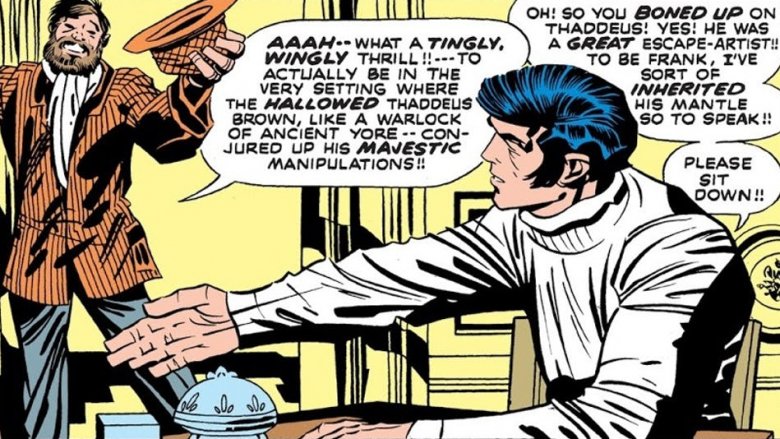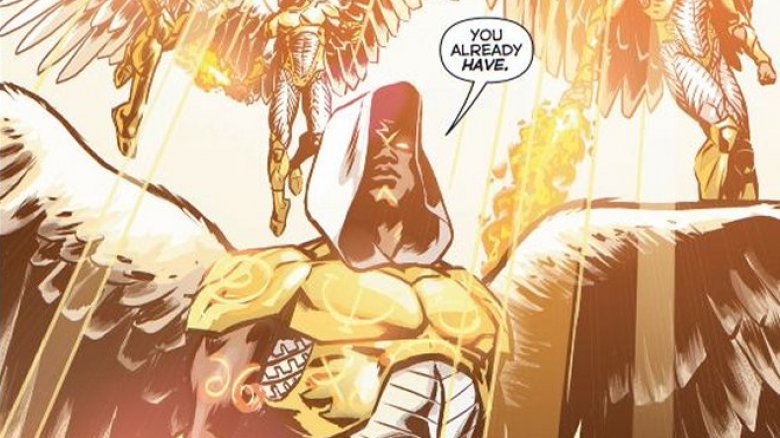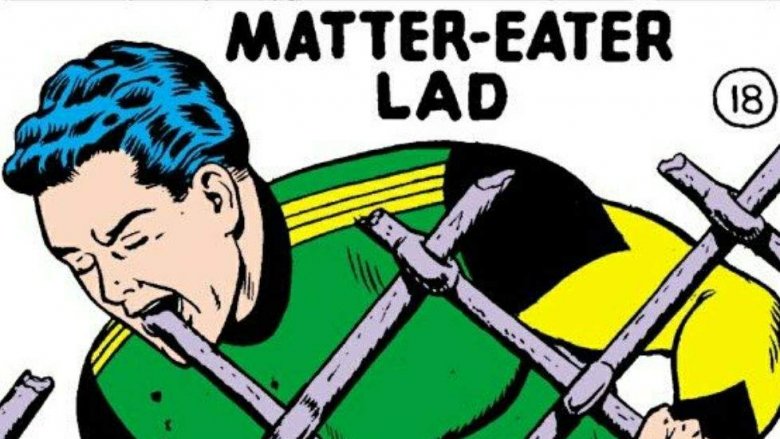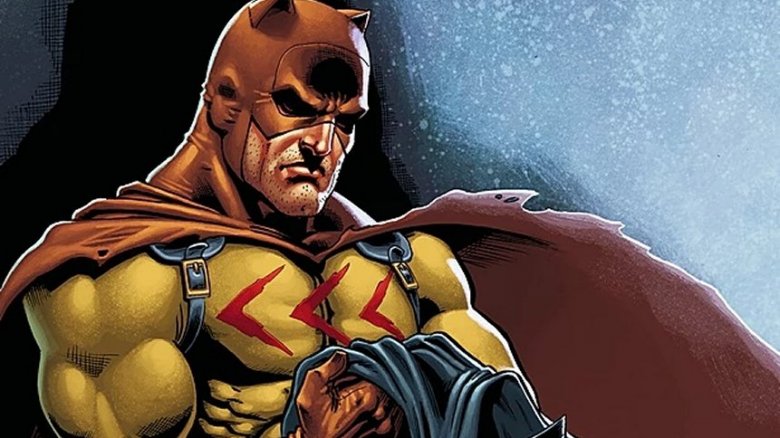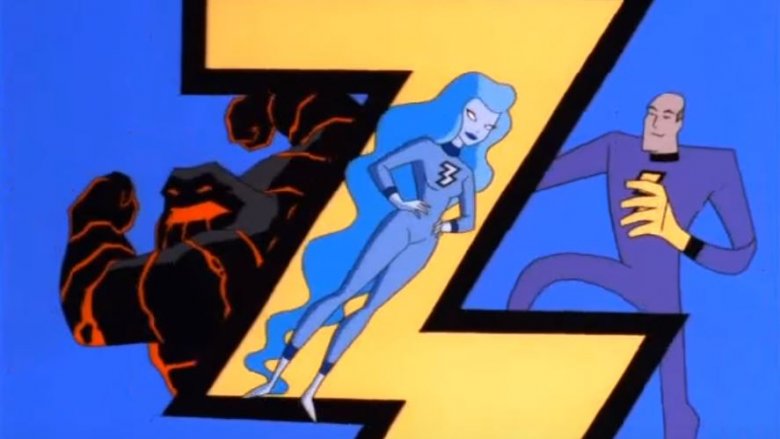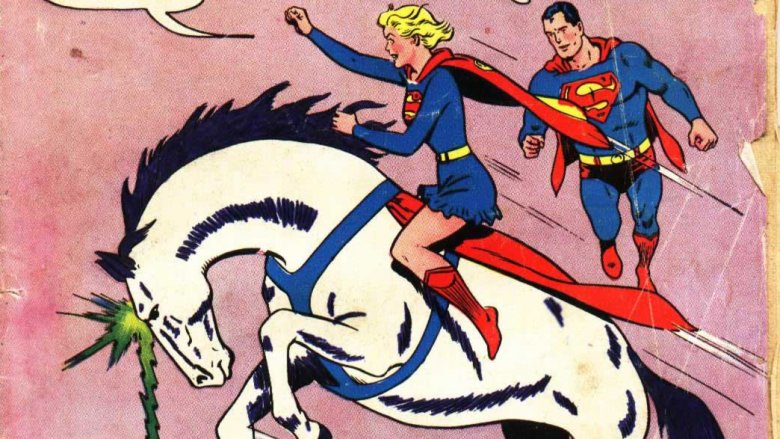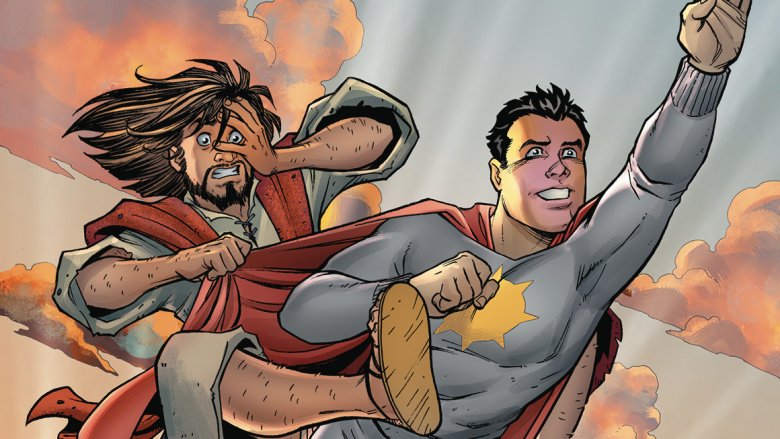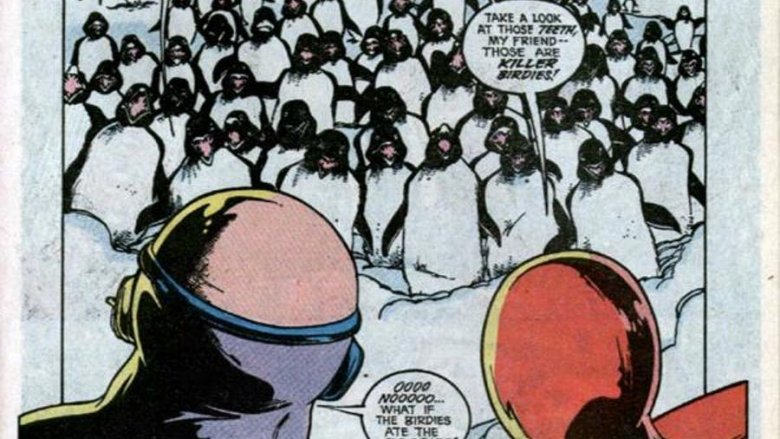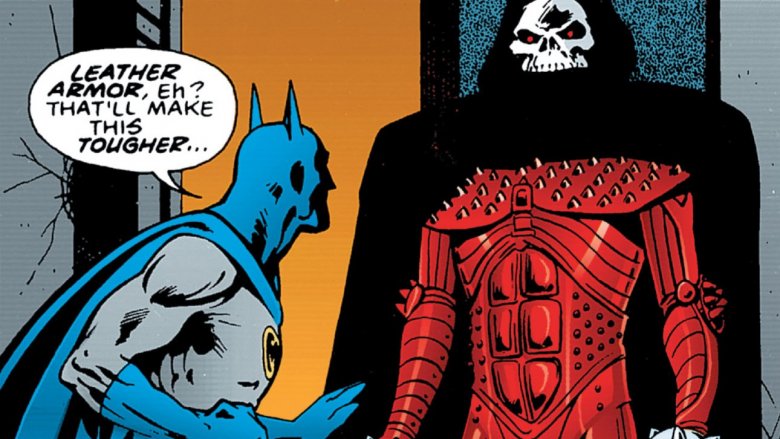DC Comics Characters Hollywood Could Never Get Right
The DCEU has taken some rough hits over the years, but thanks to movies like Wonder Woman and Aquaman, Warner Brothers seems to have finally turned their superhero movie universe around. Meanwhile, TV's Arrowverse continues rocking right along, popping out new shows like an Energizer bunny. All in all, DC Entertainment is doing pretty well for itself, and every fan should be happy to live in a world where one of the year's biggest blockbusters features a comics-accurate Black Manta ... who even wears the classic helmet!
That said, while prior DC films have succeeded at making Z-list heroes into household names, the comic books have introduced quite a few characters who would never cut mustard on the big screen. Some of these goofballs are just too silly for Hollywood. Others would never pass a focus group. What unites all these weirdos is that adapting them to film would render them totally unrecognizable from the source material.
General Glory is a wee bit familiar...
For decades, the general public saw Captain America as a laughable buffoon. Sure, comics fans always knew he was way cooler than his reputation, but everyone else laughed at the flag costume, the earnest demeanor, and the patriotic platitudes. So it's no wonder that back in the ever-cynical 1990s, DC roundly mocked Steve Rogers by premiering a spoof hero named General Glory. This red, white, and blue-clad doofus was the embodiment of what non-fans think Captain America is: a ridiculously patriotic World War II soldier who worships America; gives lots of long, boring, Stephen Colbert-esque speeches; and has an ego big enough to call himself "Democracy's Only True Hope."
Believe it or not, this guy actually earned membership in the Justice League before dying of a heart attack. But he won't ever be in the movies.
For one, the Marvel Cinematic Universe has changed the public perception of Captain America in a big way, by subverting his doe-eyed, dogmatic stereotypes to show a rebellious (though no less earnest) hero who is willing to become a wanted fugitive or take down entire intelligence agencies if it means protecting people. Plus, the MCU's playful style has already lampooned Cap's sillier aspects, like with the "America's ass" jokes in Avengers: Endgame. In today's cinematic world, General Glory would just seem like a spoof that missed the point.
Condiment King is the lamest royal around
If there's one not-so-dastardly Batman foe whose name will never stand alongside the Joker and Ra's al Ghul, it's Mitchell Mayo, better known as the Condiment King. Yes, that's really his codename. Yes, the Dark Knight really fights a dude who sprays mustard, ketchup, and pickle relish from guns, and even has the gall to spout condiment-based puns as he robs restaurants. Guess who won that battle?
Silly as the Condiment King is, he's not so unusual a figure in the realm of comic books or cartoons, where a series can last for years and joke villains" — intentionally goofy bad guys played for laughs — are actually fairly common. In big-budget movies, though, screentime is gold, and nobody would be happy if the first five minutes of the next Batman film were wasted on this buffoon. It'd be even worse if the filmmakers went through mountains of effort to turn the Condiment King into a real bad guy instead of just adapting a great and unused villain like Man-Bat. This guy did manage to get a joke cameo in The Lego Batman Movie, but that's the closest he'll ever come to big screen fame.
The overt politics of Brother Power the Geek
Listen, some filmmaker out there could make a brilliant satirical film from DC's Brother Power the Geek. But Warner Bros. will probably never touch this property with a 10-foot pole.
Here's the gist. Brother Power the Geek — invented in 1968 by Joe Simon and Al Bare, and later developed more fully by the beloved Neil Gaiman — started his life as a mannequin brought to life by a bolt of lightning. Yes, he's a puppet Frankenstein, or an electrified Pinocchio, depending how you look at it. Anyway, this living mannequin also gets superpowers, but instead of going on some cliche rampage, he instead embarks on a psychedelic adventure through hippie counterculture, learning the values of love, peace, and pacifism. Eventually, he sees the limits of his approach and decides to make a real difference in the world by running for U.S. Congress where he finally comes face to face with his wicked archenemy, Ronald Reagan.
Considering that the CW's Arrow won't even dare to glance at Oliver Queen's famously liberal politics, there's no way a faithful adaptation of Brother Power the Geek is ever happening. Sure, Watchmen is political, too, but a movie with Ronald Reagan as the big bad, shooting a living hippie mannequin into space? This thing would crack the internet in half.
This is your brain on drugs ... with powers!
If you think any DCEU movie is going to feature a bad guy who literally gets his powers by snorting cocaine, you must be on ... well, you know. Created in the '80s (when else?), Gizmodo says Snowflame was a Colombian drug lord who frequently snorted his own stash, got high enough for his superpowers to activate, and then did crazy villainous things while screaming things like "Cocaine is my god!" His powers were about what you'd expect, including pyrokinesis, super-strength, and the inability to feel pain, though he also gave anyone who touched him a contact high.
There's probably some way that Snowflake could work on film, if a movie wanted to delve deeply into his addiction instead of just portraying cocaine as a super-soldier serum. However, there are a million ways Warner Bros. could screw this up, and what parent wants to leave the movie theater explaining to their kid that cocaine doesn't give people powers in real life?
DC's not-so-kind take on Stan Lee
You could write an encyclopedia on the complicated relationship between Stan Lee and Jack Kirby, the brilliant creative duo who brought the Marvel Universe to life. For now, though, the key thing to understand is that by 1970, Kirby was tired of how the media always gave Stan Lee the credit, so he packed up and went over to the competition, DC. If there were any doubt that Kirby carried a grudge against his former partner, the truth became crystal clear in Mister Miracle #6, according to Comic Book Resources, when Kirby introduced a villainous braggart named Funky Flashman, who is clearly supposed to be a pastiche of Stan Lee. Not a lighthearted one, either. Kirby's story essentially depicts Marvel Comics as being a former slave plantation, and Funky is a deceptive, powerless crook whose livelihood depends on convincing others he's worth more than he really is.
Yeah, Jack was bitter, that's for sure. Comic Book Resources does say that another real person initially inspired Funky, but the Stan influence definitely seeped in.
For comics fans, the Kirby/Lee split is like the breaking up of the Beatles, and while Marvel Comics came to life thanks to the efforts of both iconic creators, people will probably forever debate who was "right" or "wrong." Regardless, Funky Flashman was mean-spirited enough in the comics, but if introduced to film — especially after Stan Lee's death — the character would seem outright hostile.
Biblical to the extreme
If you read some of those influential Justice League comics from the late '90s, you might be surprised to find that the teammate with the giant wings isn't Hawkman, but a guy named Zauriel. This flying do-gooder was a major hero for a while and was popular enough that you'd expect him to pop up in a film someday. There's just one issue: He's an angel. As in, a real, honest-to-goodness Christian angel, sent down by Heaven — pearly gates, St. Peter, and all — to perform some commanding righteousness. As Adherents points out, this guy even invokes the name of Jesus Christ sometimes. Yep, DC went there.
Now, plenty of ancient mythologies make prime fodder for superhero movies, particularly the Greek and Norse varieties. However, there's no way Warner Bros. wants to start populating their cinematic universe with any mythology from contemporary religions, particularly in today's polarized environment. Bringing Zauriel into the movies could mean transforming him into an everyday alien with wings, or something along those lines, and at that point you'd have the religious people up in arms and he wouldn't even still be Zauriel, so what was the point?
Hey, which one of you jerks ate the couch?
If you've ever gone digging for the goofiest superheroes in comic book history, you're probably familiar with Matter-Eater Lad. A member of the Legion of Superheroes — a comic book which introduced at least three-quarters of the weirdest Silver Age concepts — this cheerfully hungry dude comes from an alien species which evolved to eat everything. That means that no matter what you throw in front of Matter-Eater Lad, he's going to chew and swallow his way through it. A metal fence? No problem. Ray-guns? He's your guy. Those three tough-as-nails bodyguards blocking the door? Um ... sure?
Not only is Matter-Eater Lad absolutely ridiculous, he's also so overpowered that he could chew through Darkseid in seconds. On film, this would lead to every villain being easily defeated in such silly ways that even someone as dominant as Captain Marvel would look mild in comparison. Besides that, putting him into live-action would also lead to way too many awkward questions. What do his bowel movements look like? Don't ask.
Who knows, though. Maybe this guy is the next Deadpool.
Cat ... man?
Yes, lots of people will tell you that Catman, aka Thomas Blake, is far more interesting than his name might imply, especially when he's written by Gail Simone. He's a developed character who has come a long way from his not-so-impressive beginnings.
In a movie, though? It just won't matter because "Catman" is an absurd vigilante identity. No matter how you try to maneuver around it, film is a visual medium, and a live-action Catman would just come across like a half-Batman, half-Catwoman reject, with a dash of Wolverine (the claws) and none of the flair. People would constantly be asking if he's the long-lost son of Bruce and Selina, or wondering why he couldn't be bothered to come up with a more unique identity instead of just stealing her motif. Not every character can easily translate to film, and Catman is a prime example of why not.
Not so terrific
Marvel and DC often rib each other in humorous ways, and that's why Batman Beyond — remember, that cyberpunk-styled cartoon with a future Batman? — featured a spoof of the Fantastic Four called the Terrific Trio. Comprised of a Reed Richards knockoff named 2-D Man, an ice-powered woman called Freon, and a human-turned-molten monster referred to as Magma, these do-gooders live in a big tower and are Neo-Gotham's biggest heroes. That all changes when the sinister truth regarding their origin story is revealed, and they turn into city-destroying bad guys that only Batman can stop. It's a sad finish, and it only got sadder in the comics.
Obviously, these guys aren't coming to a cinema near you. While the Fantastic Four are huge heavy-hitters in the comics, their feature film adaptations have fared poorly. At this point, releasing a movie making fun of them would just feel like punching down. Besides all that, if a Batman Beyond movie does get made someday (yes, please), the Batman of the future has a lot of other awesome villains to get through first, from Inque to Blight, before the Terrific Trio should even be considered.
The perverted equine
Superman's animal buddies with their little red capes are an average nugget of Silver Age silliness that has somehow managed to survive into the present day. Even today, everybody loves Krypto the Superdog. However, not so much affection remains for Supergirl's noble steed, Comet the Super-Horse, and that's because this equine is a major creep, as Agony Booth points out. Throughout the years where Comet accompanied Supergirl into battle, the flying horse nursed a bizarre, unrequited crush on her.
To be fair, he was originally a centaur, rather than a true horse, but that doesn't make things much better. He's still thousands of years old! Furthermore, Comet's "love" for Kara apparently dated back to seeing her soon after she was born. The story only got worse when he found a way to transform into a human — according to Comics Alliance, this magic happens whenever a comet (hardy har har) passes close to Earth — which allowed him to start a romantic relationship with Kara but without revealing his true identity.
So there you go. If you thought Comet was just a goofy, old-fashioned joke hero like Streaky the Supercat, now you know that he's actually one of the ickiest DC characters ever. No wonder they haven't put him in the Supergirl TV show.
The Christian savior ... as a superhero sidekick?
Yes, this is real. In 2019, DC Comics really did announce that their Vertigo imprint was going to be putting out a book starring Jesus Christ, hanging out with superheroes. (Snopes confirmed!) The comic Second Coming, written by author Mark Russell and with art by Richard Pace, features a storyline wherein God sends his resurrected son back to Earth to become a superhero by learning from a costumed champion named Sun-Man. However, Christ's tour of Earth leaves him horrified by how Christians have distorted his original messages over the last 2,000 years, so he decides to set the record straight.
Interesting concept? Absolutely, but a big-budget studio would never put money into something this controversial, as the reaction to the comic made clear. Following the announcement of Second Coming, DC got so slammed by conservative news outlets and angry petitions that they actually canceled the comic altogether, according to NBC, so the creators had to take their story to a different publisher. Honestly, the indie market — and perhaps someday, a more indie film/series approach — probably works better for a project this subversive.
Justice League Antarctica
These days, the former "Justice League of America" has dropped the nation-specific part of their title, which makes sense, considering the team is more likely to save the galaxy from aliens than participate in voter drives. Back in the day, though, the JLA was assisted by the JLE — Justice League Europe — and according to Comic Book Resources, one comic book even introduced an exceptionally weird pocket organization from the south, called Justice League Antarctica.
You'd probably figure that this team's duty was to reverse climate change and/or keep lonely scientists company during the pitch-black winters, but nope: Justice League Antarctica was actually comprised of B-list villains — like Clock King, Big Sir, and Cluemaster — pretending to be heroes. Seemingly the primary reason they're stuck at the South Pole is mainly just because the real Justice League wanted to put these jokers somewhere they'd cause the least damage. Harsh, guys. Little did they know the team would soon be facing off against the threat of killer penguins. Yes, really!
Considering the concept of "villains turned heroes" is already associated with the Suicide Squad, not to mention Marvel's Thunderbolts, don't count on seeing these strange fellows anytime soon.
The Reaper got replaced by a better knockoff
Everyone remembers Batman: Year One. It's the definitive Batman story, in many respects. Not as many people remember Batman: Year Two, mostly because it kind of sucked. Sorry. However, one noteworthy contribution that Year Two did make to the Bat-mythos was a skull-faced bad guy known as the Reaper. This Death-themed evildoer is Judson Caspian, a wealthy Gotham socialite who by night prowls the streets with scythe-shaped wrist blades, executing those he deems immoral. He's the evil Batman, essentially, which is a cool concept. The big twist? His daughter, Rachel, is engaged to Bruce Wayne!
Oh yeah, and as Living Between Wednesdays points out, he makes lots of painfully awkward references to a certain Blue Oyster Cult song.
Year Two's lameness aside, the Reaper's motif does have strong potential, which is why the Andrea Beaumont character in Batman: Mask of the Phantasm pilfered all the best elements of the character, cut out the bad ones, and became a fan-favorite villain. At this point, if Warner Bros. ever approached the Reaper concept, they'd be far more inclined to adapt the far more interesting, cinematic, and engaging Phantasm over this red-suited, skull-faced dude with a weaker story. Dear Reaper, thanks for inspiring a better character, but your watch has ended.
